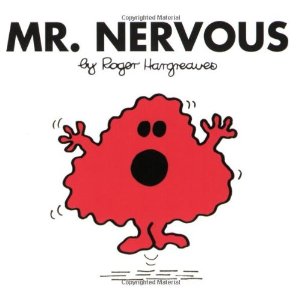 No matter if as part of a seminar or a postgraduate conference at your own university, as part of your job interview, or as a requirement for your annual progress review as a doctoral student, at some point in your academic life you will – for better or worse, some might say – be asked to present aspects of your research to other academics. Some of what I discuss in this and the next post applies to all of these different situations (and, indeed, beyond academia), but what the following lines aim to do is consider the process of preparing and delivering a conference paper (a task described by some as exhilarating, by others as bordering on the traumatic), as well as the conference experience and its benefits more generally, bearing in mind those of you who are perhaps rather shy and introvert, prone to hiding behind a cup of tea in the corner of the refreshments room, and those who might best be described as extrovert social butterflies (talking to anyone in their proximity about anything imaginable). As always, my perspective is that of someone who is firmly routed within the arts and humanities, and experiences and opinions may vary within and beyond this realm, so please feel free to discuss and ask away in the comments section at the bottom of this page.
No matter if as part of a seminar or a postgraduate conference at your own university, as part of your job interview, or as a requirement for your annual progress review as a doctoral student, at some point in your academic life you will – for better or worse, some might say – be asked to present aspects of your research to other academics. Some of what I discuss in this and the next post applies to all of these different situations (and, indeed, beyond academia), but what the following lines aim to do is consider the process of preparing and delivering a conference paper (a task described by some as exhilarating, by others as bordering on the traumatic), as well as the conference experience and its benefits more generally, bearing in mind those of you who are perhaps rather shy and introvert, prone to hiding behind a cup of tea in the corner of the refreshments room, and those who might best be described as extrovert social butterflies (talking to anyone in their proximity about anything imaginable). As always, my perspective is that of someone who is firmly routed within the arts and humanities, and experiences and opinions may vary within and beyond this realm, so please feel free to discuss and ask away in the comments section at the bottom of this page.
A good CfP (Call for Papers) will usually provide an interesting, original theme or field of research specific enough to make for a coherent event, yet broad and open enough to allow for a range of submissions approaching the topic in various ways and from diverse directions. So, how do you give yourself the best chance of having your abstract accepted, and what should you consider before submitting? Here are some seemingly obvious (though, I can guarantee you, not always adhered to) pointers:
Personal Strategy
– Are you covering material on which you will work anyway?
– If not, does new research fit into your schedule?
– What do you want? A publication? Experience? New contacts?
– Is the type of conference suitable for what you want to achieve?
– Do you have funding to cover costs? How will you pay? Are there bursaries available?
Instructions
– Stay within the specified word limit.
– Submit by the specified deadline.
– Include all requested information.
– Submit to the email address specified.
 Relevance
Relevance
– Ensure your proposed topic falls within the remit of the conference.
– If it does not obviously relate to the conference theme, signal how it does so.
– If you are unsure whether your topic is suitable, contact the organizers.
Originality
– Don’t propose a topic which is outdated or unoriginal.
– State how your paper fits into/ adds to existing contexts and scholarship.
Remit
– Propose a topic that is focused enough to make for a coherent talk within the specified time limit.
– Organizers know abstracts are often speculative, but be as clear as possible about what you hope to discuss.
– If your abstract is accepted, send an updated version before the conference programme goes into print.
Biographical Note
– Affiliation
– Thesis topic or current research topic
– Wider research interests
– Relevant publications
– Other relevant research and teaching experience, if appropriate/ possible.
– Address for research blog, website or CV
– If your abstract is accepted, send an updated biographical note before the conference programme goes into print.
 Rejection
Rejection
Being rejected for a conference is a common experience among academics of all career stages, and usually it is no reflection on you as a person or scholar. Apart from not addressing the conference theme, here are some very likely reasons an abstract may not be accepted by organizers:
– Your paper doesn’t fit into a coherent panel.
– Abstract submissions have exceeded conference spaces.
– The event is funded by a body that requires organizers to give preference to their funded students/ scholars.
So your abstract has been accepted – well done! Very often, after the initial sigh of relief or celebratory squeal, a sinking feeling sets in because you realize you now actually have to do the research and write the paper (this realization is usually followed by doing neither for a significant amount of time; don’t worry, that’s ok … for a while).
By the time you come to write your paper, or in the process of writing it, it may well transpire that your focus or opinion has changed. Again, don’t worry. That’s ok and actually very common, and organizers know this. As long as you stay roughly within the parameters of the topic you promised to cover, there usually isn’t a problem. You will often find speakers beginning their talks with a brief note to apologize because their presentation does not exactly do what their abstract promised (that is usually because they did not send an updated abstract once they realized things were working out rather differently, or it was too late by the time they realized).
Once you know what you want to say (or once you have drafted a paper/ taken notes, if this is the way you work), think about the following:
– Have three clear main points you want to communicate with your talk.
– Do not try to cram too much information or too many ideas into the presentation. Stay focused.
– Be aware of your audience. What is their background? Do you need to explain any terms or contexts?
– Be aware of fellow panelists’ papers. Are there links between papers you can already preempt?
 NERVES
NERVES
Nerves can be a big factor on the first few occasions on which you deliver a paper at a conference, and indeed throughout your career. There are plenty of ways in which you can control your nerves, and this is not the place to go into them, but here are some thoughts which may help:
– No one wants things to go wrong for you. People are supportive.
– You are at an event with people who share your interests and your passion.
– People are interested in your topic. They want to hear what you have to say!
– Don’t be put off by senior academics. They were once where you are now, and they (should) know this.
So, with this in mind, what I want to turn to in the second part of this post is the manner in which we can prepare for and deliver conference papers, including body language, tone of voice, speed of speech, and visual aids, before moving to how to deal with questions and to how I think we can make the most out of the conferences we attend when it comes to networking and learning.
GIVING YOUR PRESENTATION
 We’ve done much of the groundwork: writing and submitting an abstract, thinking about the audience and content of your presentation, and some general – hopefully calming – thoughts on your pre-conference nerves. Now that you’ve been accepted to the event, know what you want to say and in front of whom you’ll be talking, and before we skip to some ideas on how you can ensure you make the best of the conference experience as a whole, I think it’s probably helpful to look at what many consider the make or break of a presentation, almost irrespective of its content: your delivery of the material you’ve prepared.
We’ve done much of the groundwork: writing and submitting an abstract, thinking about the audience and content of your presentation, and some general – hopefully calming – thoughts on your pre-conference nerves. Now that you’ve been accepted to the event, know what you want to say and in front of whom you’ll be talking, and before we skip to some ideas on how you can ensure you make the best of the conference experience as a whole, I think it’s probably helpful to look at what many consider the make or break of a presentation, almost irrespective of its content: your delivery of the material you’ve prepared.
DELIVERY
The suggestions that follow are just that – suggestions – and you may find that other methods work better for you. The notes below originate from both observations of others as well as (and probably much more) from reflection of my own continuing mistakes when preparing and delivery conference presentations. Whatever approach you decide to take, remember that your aim should always be to communicate your topic clearly and to convey your enthusiasm for it (that is, do not assume the world should be grateful for your decision to share your infinite wisdom).
– Be clear. It can be hard to process spoken information.
– Conferences can be tiring; your audience appreciates a light note or two.
– Don’t, however, let this compromise the intellectual quality of your paper.
Structure
– Begin with a few sentences of contextual information to set the scene.
– Explain briefly how you will approach this aim (i.e. your talk’s structure).
– Include signposts in your talk so your audience can follow your argument.
– Include cross-references to other speakers’ papers (annotate your notes accordingly).
Notes & Scripts
– If you type up your full talk, avoid writing it as though it was intended for a reader rather than a listener.
– Use shorter sentences and more conversational structures than you would for written work.
– If you decide to use a script, practice it well and look up regularly to make eye contact with your audience.
– If you prepare notes, ensure you really know what you want to say and how.
– Do not use your visual aid (PowerPoint, Prezi or handout) as your script/ notes.
– Practice and time your talk. Going beyond your allotted slot is disrespectful to the audience and panelists.
– The timing of the paper is part of the task (just as the word count for an essay, for example).
– My personal rough guideline: 3,000 words = 20 minutes (at moderate pace, allowing only for little improvisation).
Tone & Speed
– Even if you’re nervous, don’t race through the talk. Communicate your ideas; don’t rattle them off.
– Next to moderate pace, intonation is key to conveying both meaning and enthusiasm. Don’t be monotonous.
– Practice both tone and pace. If you have a script, underline words or phrases you want to emphasize.
– Taking a sip of water can help shakiness, a dry mouth, and increasing speed. No one will mind the pause.
– Whatever happens, be friendly, enthusiastic and positive.
Visual aids are usually not compulsory, but – if utilized effectively – they can really help your audience to take in your talk and stay focused. If you decide to use a visual aid, consider the following points.
Practical Preparation
– For PowerPoints or Prezis, ensure the venue has the right facilities.
– Ensure your file is compatible with the venue’s system.
– Save the file on a USB stick and email it to yourself.
– Get to your session early to test your presentation file.
– Invest in your own “clicker” so you are not bound to stand/ sit where the mouse is.
– Practice your talk with your visual aid.
– In your script/ notes, include when to click to the next slide.
Presentation
– If you choose to produce a handout, number the quotations and refer to them by their number.
– For handouts and presentations, ensure you use a legible font and font size.
– Use easy-to-read color schemes (e.g. pastel backgrounds with dark writing).
– Try to make it look good, not just like a copy/ paste job. – Avoid unnecessary effects.
– Be selective with the text and data you include.
– As the name suggests, your visual aid is intended for your audience. Don’t use it as a script.
– Proofread your presentation/ handout to avoid typos.
– Read out the quotations you provide; don’t let your audience read in silence.
QUESTIONS
 At most conferences, each panel will include a certain amount of time for questions and discussion. This can happen after each paper, or after all panelists have spoken (we’ll look at the some of the benefits of these formats in the post on conference organization in a few weeks). As a very general rule, try to adhere to the following basic points. As so often, most of these tips will hopefully seem like common courtesy, but most of us have witnessed uncomfortable situations where common courtesy was clearly discarded, not infrequently for the purposes of ego boosting.
At most conferences, each panel will include a certain amount of time for questions and discussion. This can happen after each paper, or after all panelists have spoken (we’ll look at the some of the benefits of these formats in the post on conference organization in a few weeks). As a very general rule, try to adhere to the following basic points. As so often, most of these tips will hopefully seem like common courtesy, but most of us have witnessed uncomfortable situations where common courtesy was clearly discarded, not infrequently for the purposes of ego boosting.
– If a question is directed at you, have pen and paper handy to take notes.
– Thank the person who asked a question.
– If you are unclear as to what exactly a person is asking, politely ask them to clarify.
– Don’t be defensive or rude (even if others are). Be friendly, open and thank them for the question.
– If you cannot think of anything to say in response to a question, ask what the person who asked it thinks.
– Alternatively, say that it’s an interesting point and that it’s something you really should look into.
– Be enthusiastic but concise with your responses; there’s questions waiting for other panelists.
– If you have more to say than there is time for, arrange to meet the person during the next break.
– Treat questions as a valuable contribution to your work, not as a personal attack.
ENHANCING YOUR CONFERENCE EXPERIENCE
 At their best, conferences can be stimulating and exciting events during which you discover new ideas for your own research, develop professional relationships which turn into fruitful and rewarding collaborations, and get a sense of the most recent developments in your field. At their worst, conferences are exhausting, awkward and not to mention expensive. So here are some general thoughts on what you can do to make your conference experience as positive as possible:
At their best, conferences can be stimulating and exciting events during which you discover new ideas for your own research, develop professional relationships which turn into fruitful and rewarding collaborations, and get a sense of the most recent developments in your field. At their worst, conferences are exhausting, awkward and not to mention expensive. So here are some general thoughts on what you can do to make your conference experience as positive as possible:
– If possible, allow yourself to relax. Don’t arrive at the last minute. Stay over the night before if costs permit.
– Have your paper printed beforehand (I’ve travelled with my printer in the boot; not a good idea!).
– If you don’t know anyone and are rather shy, don’t be afraid to start speaking to people about their work.
– It can be difficult and awkward, but you can practice your social skills for these occasions.
– Don’t be afraid to ask people for their contact details, and follow up discussions via social media.
– You can make contact with other delegates before the conference, too, which makes it easier to talk to them on the day.
– If there’s someone you really want to meet, approach them and tell them!
– Most importantly, these people share your interests, and are just as nervous as you are!
I was really excited by all your responses to the first post via Twitter and the comments section. Please do keep the conversation going, not just with me, but with others, too! I’d love to hear what your first conference experiences were like, or whether you are currently preparing for a conference. Are you nervous? Have any questions or issues come up that I haven’t discussed here? What have you learned from your conference experiences?
This Friday, we’ll stay within the realm of communicating and presenting ideas, but turn to a different audience with a post on ‘Great Expectations: Beginning University Teaching’. If you have any particular things you’d like me to cover, get in touch.
Until then and as always, thanks for reading and have a great week!





Halo Nadine, I definitely love this blog. This article make me confident to show my research in a conference.
Thanks for this post, I remember reading it a while back. It’s certainly helpful in getting rid of a few nerves that I have for my first external conference paper in June!
Hello,
What a useful blog. After giving fifteen papers over the course of my PhD, my one tip will always be that, on average, 2,500 words is 20 minutes speaking time. It’s so important to stick to time. If you can do that you always look professional, running over, and rushing,makes you look the opposite. Looking through a long paper, rushing to leave stuff out, only makes you flustered. The confident person prepares, and prepares again.
Thanks
Stephen Etheridge
University of Huddersfield
Very useful. I personally have been fortunate to have had a 5 year degree where oral presentations were mandatory at every single subject (10 per academic year plus one or two for final year projects). I left with about 52 presentations for small and large audiences, always with peers and senior academics. Six years and many talks later, I’m still nervous before a talk. I just learned how to hide nerves better and past the first two or three minutes! But I think it helps that I enjoy presenting. My hubby, for instance, just finds the whole experience dreadful and has never felt comfortable no matter how much preparation and mindfulness practice he engaged in!
Thanks for the post Nadine, I’ll be passing it on. One thing to add in, from experience, might be the importance of how applicants and delegates treat everybody involved with the organisation. We can all feel that our own invidividual work is very important, have our own comfort zones, and sometimes nervous people can come accross as a bit blunt. Organising a conference is usually pretty much done for free on top very heavy workloads, often with a difficult budget and often staffed for free by volunteers. I’ve been at a lot of conferences where unfamiliarity of the format, a different style or format of organisation, or timetable, or whatever, has been met with grumpy resistance. I think that this backs up you your point about choosing the right conference and can particularly be the issue for interdisciplinary or international conferences. If you don’t like where the conference is, or the budget/accommodation, presentation format it takes, please don’t take it out on the organisers. Choose carefully.
Hi Lucy! Yes, you’re absolutely right (though luckily, as an organiser, I’ve been fortunate with this so far). Whatever has gone wrong from your point of view, always assume that the organisers have done their best to accommodate your needs, and remember that often a lot of other people are involved in the running of the event (not least catering, who may have forgotten your veggie option although the organisers requested it, or facilities, who didn’t set up the sound in the room in which they should have, etc.). If nothing can be done to rectify the issue there and then, try to be constructive nevertheless and make the best out of it; you can usually leave feedback after the conference (either via a dedicated form, or by email to the organisers). Being rude or aggressive certainly won’t solve the issue, and makes things more unpleasant for yourself and everyone else. More about all this, though, when we come to organising conferences, as there are easy ways to ensure that the majority of your delegates are happy! 🙂
Great post Nadine. With my conference organiser hat on I would say that sending an amended abstract is really important if you are deviating from what you promised. Conference feedback suggests that papers that didn’t do what they said on the tin elicit the biggest grumbles.
Another really obvious point (so obvious that it shouldn’t need to be said perhaps) is when submitting papers/proposals send what you are asked to send. If the organiser has created a submission form – use it! Not using it won’t result in automatic rejection (at least not from me) but it will occasion a few ”gggrrs” and you want to keep everyone onside I think.
At some conferences I have been quite taken aback by the ferocity with which the audience can react if the paper challenges some dearly-held assumptions – the silent majority will be on your side and inwardly if not audibly cursing the rude challengers.
Thanks so much, Jennie! I do hope I’ve addressed a few of these points in today’s follow-up post, and I completely agree re rudeness. Don’t rise to it, but stay friendly at all times (usually it’s the rude person who has a problem, and that problem is normally not you, even though they’re making it out to be). I pity people who feel they have to be very aggressive or rude towards a speaker (providing what’s been said wasn’t outrageously sexist, homophobic, racist, etc.).
Love this post Nadine.
Seems to be an ongoing source of conversation in the community and the more opinions we get on the topic, the better.
A similar type of post from our PhD Life blog editor, Tomi http://blogs.warwick.ac.uk/researchexchange/entry/the_stand-up_academic/
Great post, Nadine! Makes the process of conference-ing very accessible. I wish this was around for my first time!!
Chloe – small, small world: my first ever paper was as an MA student (at Liverpool, at the time) at a conference at Chester! Is it for the ‘Talking Bodies’ conference by any chance?
Picking the right place for your first conference is so important – I chose the institution where I had done my undergraduate degree and would be returning for a PhD, so there were plenty of supportive faces in the audience. This definitely helped.
Personally, I absolutely love conferences, and would do one a month if I could. They really help to focus my thinking, and I really enjoy the networking, too. I also find them extremely rewarding, as I can feel myself becoming more confident in every one that I do. I’ll be giving my 13th paper at a conference in Bangor next month, an event which should enable me to gain some really useful feedback on my thesis. I’m in the final stretch of the PhD now, though (aiming for July submission), so do need to decrease my presentation-rate!
I completely agree with Catherine – a heightened version of yourself is what I aim for. I’ve also developed ‘strategies’ for presenting, including how I stand, where I position myself to the screen, and how I speak. I tend to naturally talk very quickly, and I’ve learned that if I enunciate every single ‘t’, ‘d’, ‘s’, etc, it really helps to slow myself down. It’s become second-nature now. I often feel that having ‘control’ over such practical things assists with the nerves, too.
I’ve been involved in the organisation of a few conferences, and earlier this year managed to pull off my sole-organised conference. Really, really great experience, and one that has taught me a huge amount about conferences whether you attend as an organiser/keynote/delegate/guest.
Thanks, Nadine – great topic, and as insightful and energetic as usual 🙂
Anna
Hi Anna,
Yes, it is the Talking Bodies conference, very small world indeed!
I am sure that I will benefit hugely from the conference, if my paper is accepted, and I already feel more confident in submitting an extract having read Nadine’s post and all of the comments.
Good luck with your PhD.
Chloe
Hi Chloe,
Fab – best of luck with submitting the abstract, and I hope to see you there!
Anna
How about not writing an essay and simply reading it? Most academics’ idea of presentation seems to consist in looking up
From the paper every five minutes. Everyone avoids eye contact awkwardly – not a great experience at all.
Jules, I completely agree, though I have sympathy with those who are too nervous to do anything else. I’m particularly allergic to people using things they’ve already published (or have in press), and instead of preparing a talk, they take the paper that was intended to be *read* and not *heard* and skip through, seemingly at random. More about the actual act of delivering a paper in Monday’s post – would love to hear your thoughts on that.
Great post, Nadine. Having organised a few conferences myself, I’d like to underline the point about rejection not necessarily being a reflection on you or your abstract. Recently, I had to reject some EXCELLENT proposals, simply because I couldn’t fit them all into a coherent one-day schedule. I felt awful the e-mails – because I know how horrible it feels to get them – but it gives you real perspective. Probably most of the time if you are told ‘your paper was excellent, but …’ the conference organisers are not just being polite.
Another point: you will eventually develop your own style of presentation. It’s good to look at how other people present and pick up tips, but don’t try to be somebody else. I try to be a ‘heightened’ version of myself, if that makes sense. If you try to adopt a completely different persona it can fall flat. Trust your gut.
A really excellent post, Nadine! This is the one topic that comes up consistently in terms of questions I get asked in my BSA Postgrad Convenor capacity; a great many people are incredibly nervous of speaking in public and worried about rejection to such an extent that they don’t put in abstracts. I definitely feel that a little more transparency around how often people get rejected (happens to everyone at some time!) and that most people get nervous about presenting – even seasoned academics – would go a long way to supporting postgrads and early career academics.
My first academic presentation was earlier this year at Sussex. Fortunately, having spent a great deal of time getting up in front of large classes of teenagers I don’t get especially nervous about public speaking but I’m never sure how my brand of English literature meets sociology/history/philosophy/politics will go down. Having presented at several conferences since and given a literary bent to social sciences work I think, for me, what has always proved popular is i) having something an audience can easily connect with: my work doesn’t necessarily appear as complex or as theory-heavy as some but this means that people engage more easily; and ii) picking a topic that has wide enough appeal that everyone in the room, no matter if it’s not their direct area, will have something to say on it.
And finally, smiling and showing a confident demeanour, even if you don’t feel it. If you’re obviously nervous your audience will be too. Deep breaths, speak more slowly that you think you should (ensures you don’t gabble) and look at your audience.
I think a similar post more focused on presenting in university seminars would be useful for very early postgrads. I’ve seen some seminar presentations recently that made me cringe for the presenter, but also realize that new Master’s students need some help!
I just would like to congratulate you for producing (yet again) a very useful and honest post. I am convinced that it will prove to be of great help both to graduate students and new PhDs. I would even go as far as to say that senior scholars should also consult it for themselves.
Very well done, Dr Muller!
Esther
Having decided to submit an abstract for a conference at the University of Chester for the first time as an MA student, this is extremely helpful Nadine, and hopefully will be even more useful if my abstract is accepted! I will definitely be using this as a guide to complete my abstract by the end of the month.
I am really looking forward to the forthcoming posts in the New Academic too!